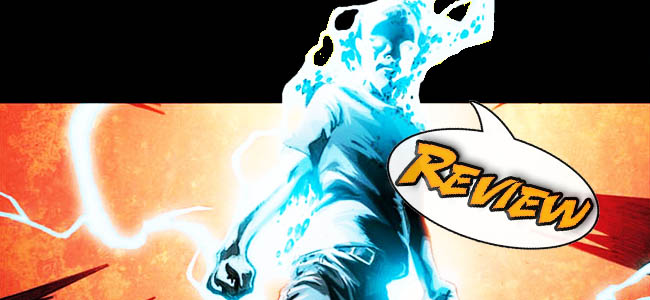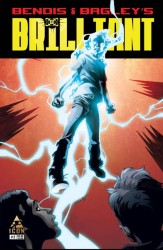Or – “Any Resemblance To Ultimate Spider-Man Is Purely Intentional.”

I think there’s a lot of truth to the expectation that a normal kid, given super-powers, would be more likely to trash stuff and rob banks than he would be to focus on great power, great responsibility and such. But Albert’s dilemma may be more complicated than he thought, as his friends reveal the secrets of the experiments into super-powers.
 BRILLIANT #2
BRILLIANT #2
Writer: Brian Michael Bendis
Penciler: Mark Bagley
Inker: Jose Rubinstein
Colorist: Nick Filardi
Letterer: Chris Eliopoulos
Editor: Jennifer Grunwald
Publisher: Icon (Marvel Comics)
Cover Price: $3.95
Previously, in Brilliant: Albert is a brilliant (see what they did there?) scientist who has returned to school after taking time off to deal with the fallout from a bad breakup. During his absence, he has stumbled onto the secret of superhuman powers… Y’know, like you do. At the end of last issue, he was utterly stunned to find that his schoolmates have likewise cracked the code that leads to superhumanity. That’s quite a coinkydink, ennit?
THIS FEELS FAMILIAR…
There’s a problem when reading a book by an artist with a REALLY specific style. Mark Bagley’s work here immediately reminds me of his work on Strikeforce: Morituri and New Warriors about a million years ago. We open in a dorm room, which gives me the twin feelings of recognition and nostalgia, as Albert discovers the truth about the theoretical experiments his classmates have been putting together in super-powers. Bagley is in rare form this issue, as we cut to Amadeus at a roulette wheel, using his newfound telekinesis to rig the wheel. It’s an interesting combination of familiar story trope with patented Bendis dialogue, and it works really well… until Amadeus tries to cash out and gets roughed up for his trouble, Terry Benedict-fashion. The punch-out sequence feels very artificial, like a kid’s idea of how casinos are suppose to work based on a steady diet of George Clooney movies. Things quickly pick up, though, as Amadeus loses his temper, and goes Doctor Manhattan all over his attackers…
…BUT I CAN’T QUITE PLACE IT.
There’s a very cinematic feel throughout this issue (and last, as well, now that I think of it), providing movie transitions from scene to scene, including one from a rampaging Amadeus to Albert daydreaming about his favorite superhero, The Blast. (Blast’s costume looks mighty familiar, with red trunks, boots and cape over a blue unitard, but it’s probably okay, since the other guys aren’t using it anymore.) The other kids get their character bits, reminding me more than a little of Morning Glories (one’s an insecure nerd bullied by his dad, one just slept with a member of the faculty, one’s The Chick) and the group finally inducts Albert into their secret: Amadeus has been given powers. There’s a twist, though, as the group needs his help, and things end on an ominous note as a federal agent arrives looking for the security footage from the now-half-destroyed casino. There are a lot of familiar building blocks flying around in this series, but as yet they’ve not fallen completely into recognizable cliche patterns.
THE VERDICT: IT’S PARKER-IFFIC!
There is a strong resemblance to bits of Ultimate Spider-Man in the issue (Amadeus resembles a college-age Peter Parker, and I’m reminded of the Ozcorp storyline which revealed that everybody had the same origin or whatever) but other pieces as well, some of which may actually be half-remembered tales from my own college years, co-written with friends in the dormitory back in Clinton era. Either way, I once again found myself enjoying Brilliant, getting dragged along in what is almost certainly going to boil down to a “The Craft” firefight between Amadeus and Albert, with the other kids picking sides or getting picked off, and yet I want to know how it all goes. Bagley is working at top form here, and I personally love his artistic vision, while Bendis always works better with characters whose personalities and spech patterns he has created himself. Brilliant #2 is a fun ride for me, worth the addition dollar or so that the creator-owned status makes it cost, earning 4 out of 5 stars overall. It’s a lighter, less profane, take on the stories Mark Millar has built his Millarverse on, and that works just fine for me…
Faithful Spoilerite Question of The Day: Given that many of us would certainly cash in on super-powers if we got them, is the idea of the larger-than-life noble superhuman of the Silver Age a completely discredited trope?




4 Comments
I don’t think that silver age heroes are a neccisarily discredtited trope, just a less common one nowadays. Kinda like when Lex Luthor doled out superpowers to the general public back in 52, I think most people would still try to fit into that hero role. They’d throw on their colored tights, just in case, and go to work like regular joes. And if a car wreck just happens to pop up, I doubt they’d just turn up their noses at a chance to help. But then again, I’m an optimist…
As for your qotd, I know that’s what both Mark Millar and Frank Miller (coincidence in the similarity of those last names? I think not.) would have you believe.
I still think there are plenty of stories you can tell about the noble hero. Look at what Bendis and Bagley did with Peter Parker in Ultimate Spidey.
I always liked the EARLY Spiderman because Pete was a troubled youth who was unsure what to do with his powers, and when he tried something self-centered it usually blew up in his face, and if the tried to do something noble, it usually blew up in his face. The poor schmuck couldn’t win. Nonetheless, he always tried to learn from his mistakes and grow.
In the same way, I was always troubled by the Noble Silver Age heroes who instantly got powers, as if super powers came in Cracker Jack boxes, and became Instantly Noble Heroes, missing most of the classic Hero Quest where the hero has to strive and overcome before he turns into a true hero. I think that is why Star Wars is so popular, is that it takes a poor shmoe and takes him on the classic Hero Quest, allowing him to grow as a character and triumph in the end.
Most comics seem to skip the whole middle part.
It depends. Sorry. I wish I could give you a better answer, but it depends on the person.
I remember a back-up story that Peter David did in an issue of The Incredible Hulk. It was a paper written by Doc Samson on The Effect of Gamma Radiation on the Mind. According to his theory, the gamma mutations were molded not only by the amount of gamma radiation exposure and the frequency, but also by the repressed subconscious desires that were within the subject. Examples? Bruce Banner, a guy with problems handling his anger, becomes a biological weapon of mass distruction due to his lashing out at the world. The Leader, who was a janitor with average intelligence, becomes one of the smartest people on the planet.
It’s a classic question. If you could, would you? The answer, unfortunately, depends on the mental state of the person involved. Silver Age mentality is possible, but so is Watchmen.